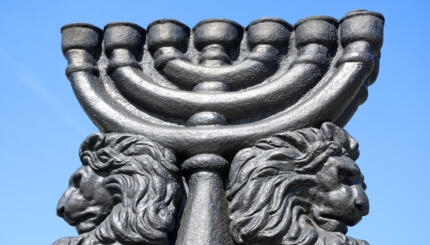Commentary on Parashat Terumah, Exodus 25:1-27:19; Numbers 28:9-15; Exodus 30:11-16
With Parashat Terumah, the major theme of the rest of the Book of Exodus is now introduced. Great detail is given about the construction of the Mishkan (Tabernacle), the portable sanctuary that was the centre of the Israelites’ religious life during the years they wandered in the wilderness. The Mishkan was “God’s dwelling place amongst the people,” where sacrifices were offered and God communicated with the people through Moses and the High Priest.
Very detailed instructions are given to Moses as to how the Mishkan should be built and what materials are to be used. Included among the Kley Kodesh (“holy implements”) are the Menorah, the altar for sacrifices, the Ark, and the Holy of Holies. The portion begins with God asking Moses to ask the Israelites to bring Terumah, usually translated as “gifts,” meaning something like “contributions” or “donations,” but they are to be freewill offerings.
In Focus
Speak to the children of Israel and have them take for Me a gift offering; you shall accept gifts for Me from every person whose heart so moves him. (Exodus 25:2)
Pshat
Moses is up on Mount Sinai and God is giving him instructions to pass on to the Israelites. The specific topic of discussion at this point is the building of the Mishkan (the Tabernacle). But before God passes on the details of how the Mishkan is to be built, they must discuss the building campaign–how they will collect the materials needed for this lavish construction project. The answer (you guessed it) is fund-raising. Moses is to ask the Israelites to bring Terumah–“gifts”–for the building of the holy place. However, these are not taxes, but rather donations–freewill offerings from each person “whose heart so moves him.”
With your help, My Jewish Learning can provide endless opportunities for learning, connection and discovery.
Drash
Anyone who has ever sat on a synagogue [board], school [board] or other nonprofit board knows how important fundraising is. Without that kind of important support, these significant institutions would not exist. But they also know how difficult it is. Convincing people to part with their hard-earned funds to support even a worthy institution is, understandably, not easy. Imagine how much more difficult it would be to convince a group of people just two weeks out of slavery to make contributions to build a house of worship for an invisible (in Egypt they could at least see the “gods” in the temples) God. Talk about a hard sell.
God, in asking this of Moses, seems to understand the difficulty of the task. And so the language of the request is very precise. God asks the Israelites to “take” for Me Terumah. An interesting choice of words. Can you “take” a freewill offering? It really means that the Israelites should “give” a gift for the construction of the Tabernacle. But instead it says they should “take.”
Rashi seems to connect the use of the verb “take” to the specific type of offering being requested. Terumah is defined as a “heave offering;” a special type of offering that is to be “set apart.” Therefore it is the individual himself who “takes” the offering voluntarily from his own possessions and designates it as a sacred gift.
But a Yiddish folktale gives another perspective on the difference between “giving” and “taking”:
“Yankel the Cheapskate” would not give money to anyone, for any reason. It didn’t matter how important the cause. No one could crack him. He just wouldn’t contribute. One day, Yankel was crossing the river in a small boat. Suddenly, a huge storm broke out, and his boat capsized. Luckily, another boat approached. The sailor called out to him: “Give me your hand. Give me your hand.”
Yankel could barely hear him over the strong winds and the roaring waves. He heard only one word, over and over: “Give, Give…”
And good old Yankel couldn’t help himself. He yelled back: “No. I don’t give. I don’t give.”
Again: “Yankel, give me your hand! Give me your hand.” And again Yankel screamed: “Never. I don’t give.”
Finally, in desperation, the rescuer yelled: “Yankel, take my hand.” And Yankel said: “Oh, take? Sure.”
Jewish tradition teaches us that giving — Tzedakah — the opportunity to help others — is just that: an opportunity. It is a privilege that benefits us as much as the ones to whom we give. Therefore there is really little difference between giving and taking. Every time we give–we are really taking.
There is an old folk saying: “A fool gives and a wise person takes.” The wise person realizes that it is he who benefits most from his action of giving. This is the difference between charity and Tzedakah. In charity, we give, and it is a one-way street. With Tzedakah, we are actually obligated to give, everyone, equally. It is an act of righteousness.
If everyone gives, then we benefit from living in a society where everyone’s needs are met, and none are in need. To live in such a society benefits all. To live in such a society is a privilege. And for all that we give, we benefit much more.
Dvar Aher
Take for me an offering (Exodus 25:2).
King Solomon says, Take my rebuke, and not money (Proverbs 8:10). This means that a person should take Torah’s words of rebuke to heart, rather then simply amass wealth. Through the Torah one can possess this world and the next, while material possessions lead to nothing but worry and aggravation. (Tz’enah Ur’enah)
Provided by KOLEL–The Adult Centre for Liberal Jewish Learning, which is affiliated with Canada’s Reform movement.
Torah
Pronunced: TORE-uh, Origin: Hebrew, the Five Books of Moses.



